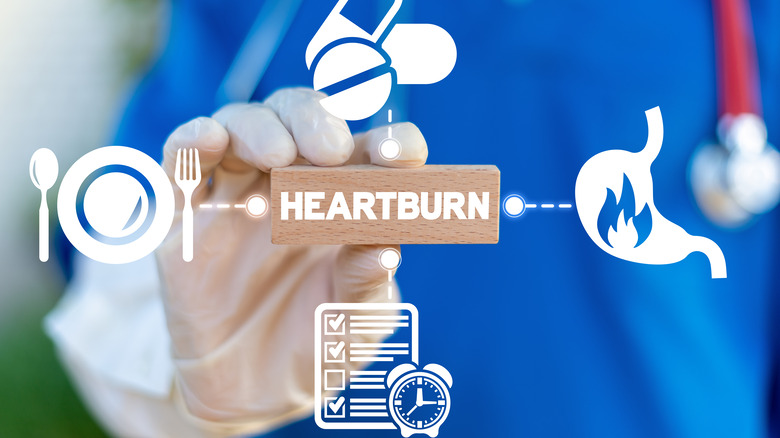If You Have Frequent Heartburn, It Could Be A Sign Of This Condition
If you've ever experienced heartburn, you know just how painful that burning sensation in your chest can feel. Despite its name, heartburn doesn't affect the heart. Heartburn is what occurs when acid from your stomach comes up through the esophagus, which is the tube connecting the throat to the stomach. According to the Mayo Clinic, when you swallow food or drink, the muscles at the bottom of your esophagus relax, allowing any meals or liquids you've consumed to pass through with ease.
Once those contents reach your stomach, the muscles close again until your next bite. However, the band of muscles at the bottom of your esophagus, also known as the lower esophageal sphincter, has the possibility of atypically weakening or relaxing. When this happens, heartburn is the result, and it may feel worse when you lie down (via the Mayo Clinic).
Symptoms of heartburn can be mild or downright painful. WebMD notes that heartburn symptoms can range from burning in the chest or throat to difficulty swallowing and leaving a bitter taste in your mouth. For some people, heartburn only lasts a few minutes, but for others, it can last hours.
Why frequent heartburn may be serious
While heartburn is common, experiencing frequent bouts of heartburn may be a cause for concern. If you have heartburn more often than not, you may be suffering from GERD, or gastroesophageal reflux disease. GERD is a condition in which stomach acid frequently refluxes into the mouth and esophagus, according to Piedmont. The condition can affect both men and women, and sometimes children, but is seen more in those who are overweight, smoke, or consume too much alcohol or caffeine.
Heartburn every now and then usually isn't serious, and it's possible your spicy food is to blame. However, GERD is a condition that shouldn't be left untreated, as it can lead to more serious conditions, like esophagitis. Too much stomach acid in the esophagus can lead to esophagitis, or inflammation in your esophagus, Family Doctor reports. Bleeding or trouble swallowing can happen as a result of esophagitis, so it's vital to reach out to your doctor if you have frequent bouts of heartburn.


